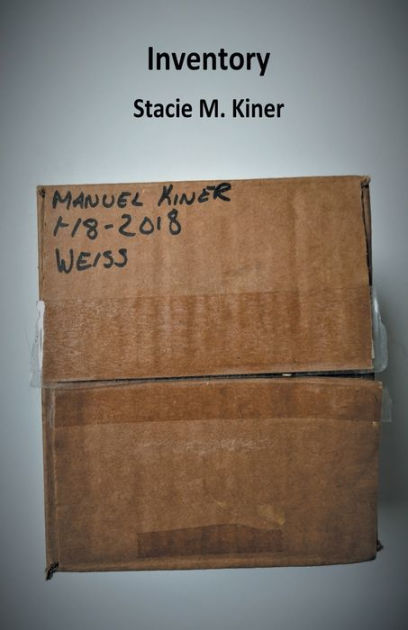
Inventory
Stacie M. Kiner. Finishing Line Press: Georgetown, KY., 2021.
In Stacie M. Kiner’s Inventory lost loves and loved-ones circle in a whirl of remembering. These moments are the painful ones most of us would like to forget, but Kiner reveals how these are life’s key moments we must never let go.
Though the sense of longing in these poems is powerful here for past loves, the immediacy of unforgettable intimate moments strikes with passion, a fever of pleasure, an enveloping of all senses. The allusions can be direct, as in “God and Morphine”: “Sex became difficult. / All I could do / was float on the bed / dazed . . . drawing crazy hearts / on her cheek”; or in “The Only Faith”: “It was easy after that, / turning you into an altar– / believing sex / was the only faith.” Kiner also excels at subtly capturing moving and erotic detail. This particularly comes to light in “The Only Faith”: “scotch and ice / sliding down my arm, / melting between / your clinched teeth” but also in “All the Ways to Want Things” as the poem’s narrator reflects on a past lover: “Our world . . . / unbuttons itself. . . . // . . . a sun-warmed Key lime / sliced in half / its juice on your tongue. / Your husband gone. . . .”
Another sense of loss that soulfully permeates many poems captures the relationship between the poet’s narrator and father. This is especially true in “Parachute,” where the aging figure is shown slipping deeper into diminishment, perhaps dementia, a deflating of his existence (“he stopped getting / what he wanted / then stopped caring / then stopped noticing”) and even more powerfully in “Winding the Watch,” as the poem observes “Covering mirrors / in the gradual / dismantling / of his brain.”
This poem, as do many, highlight Kiner’s ability to create a dialogue of inquiries between the poet and the reader, an ocean of questions that seem more like assertions that cut to the core. The line “Isn’t this what happens, / resuscitating time, / wanting to wind / a watch / that doesn’t wind?” captures so much of what’s at the heart of “Winding the Watch,” the reversal of roles between parent and child as years pass, the complicated sense of guilt that overwhelms as one sees the inevitably of losing a parent.
In “The Way Love Sometimes” the short lines accent our hours lost, time’s passing: “I wonder / how much / can rivers swallow, / how much / of my life / do I have / to remember— / the half that is gone / or the half I think / remains?” Consistently Kiner uses short lines to create a soft staccato punch that hammers a drumbeat, accenting the passage of days, the birth of loss, the recall of forgetting.
This theme also resonates in the book’s title poem as the narrator asks, “Now that your envelope / of silence / will never be opened, / what did it take / to not become / tomorrow?” Thoughts linger on a box of ashes, ashes spread in gardens, kept in backpacks, and linger longer in memories, such as the “third home” with “wheelchairs aligned like planets.”
This dialogue of inquiries also appears in the form of celebration (tinged with subtle melancholy). In “Venetian Pool” we are asked to consider “Of what else / are we made / but / steam streaming / off trees . . . // the bicycle / rusting / in the rain?” And in “Continuous” the narrator wonders “As everything moves / against forgetting, / will the river / keep count . . . remembering the body. . . ?” Moreover, “Noche Buena Miami, FL. 2010” reveals both contemplation and humor: “Wasn’t that the night / someone left the cake out / in the rain?”
Rain and water are often central metaphors here, liquid slowly making its way through structures one drop at a time. Kiner’s lines reveal worlds held in “buckets of water / that fill on the floor,” “bowls of sadness / . . . filling / with rain,” and “a cracked slate roof / in a home with bowls / filling. . . .” The emotions, like the water, seep through and hint at an emotional and intellectual landscape that soaks through us, that both invigorates and uncovers.
All poems in Inventory resonate powerfully; Kiner’s voices are soft but necessary voices that will make all readers grapple with the unanswered questions that carry us through our lives.
–Michael Trammell
